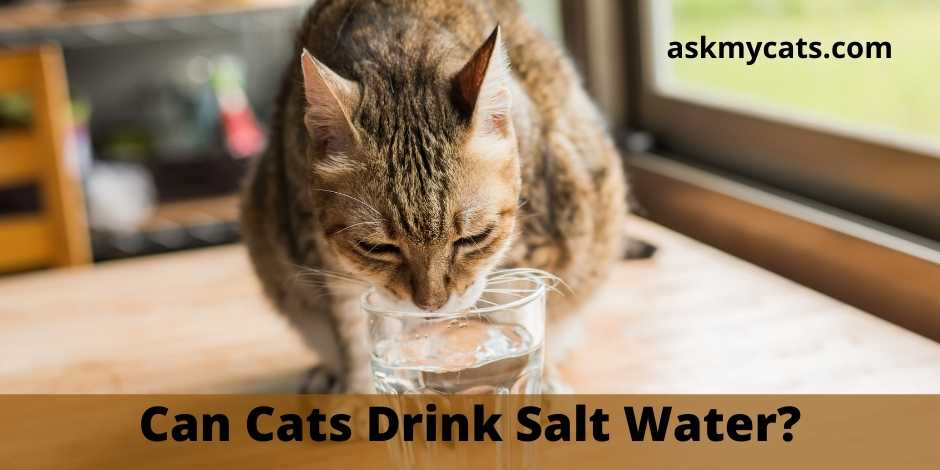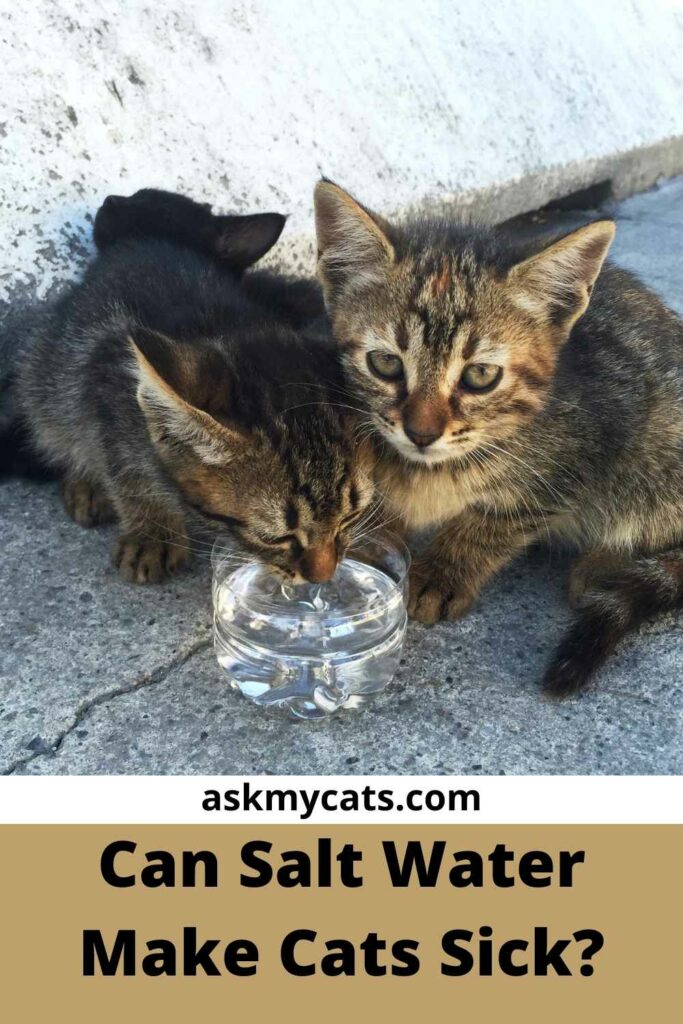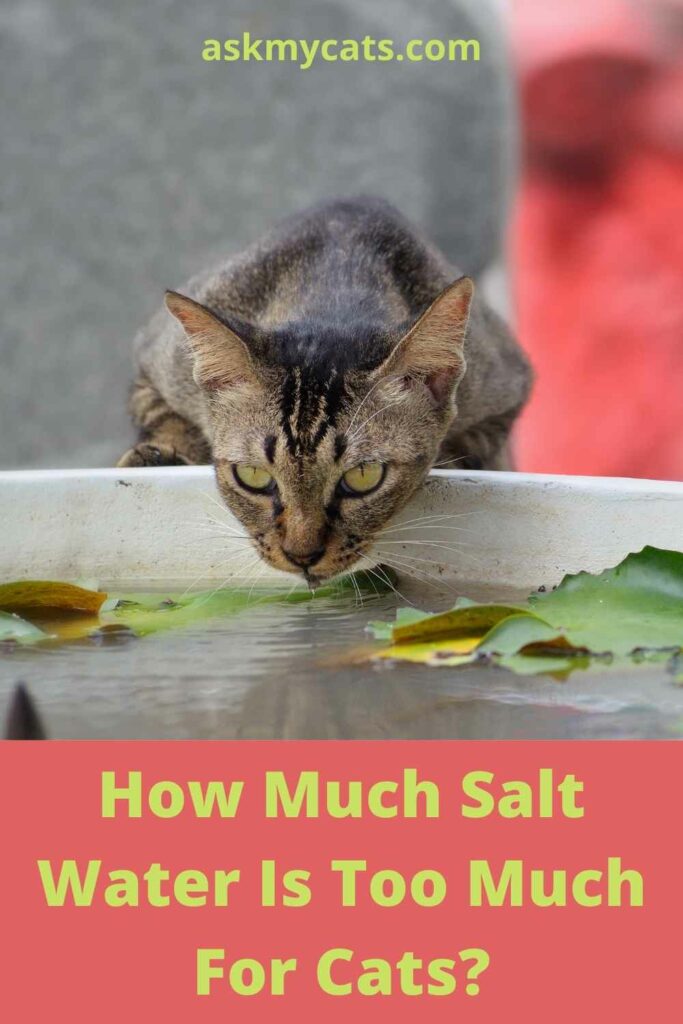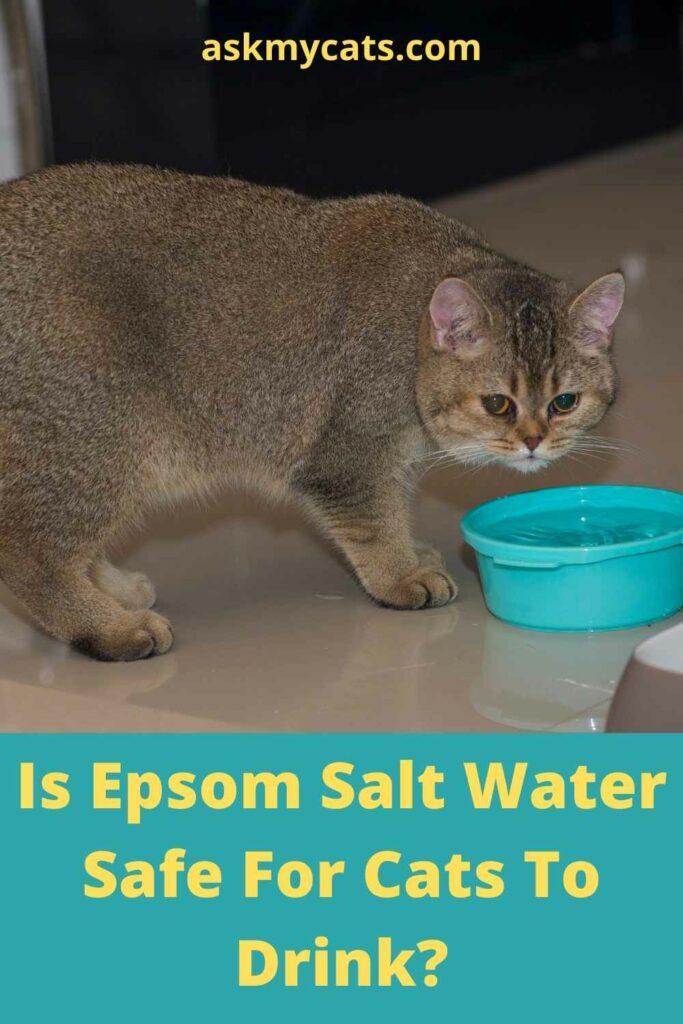While a glass of saltwater will not refresh you, it will surely rejuvenate your cat. Feline kidneys can filter salt out of water, allowing cats to sip salt water to absorb and rehydrate.
Cats can, in fact, drink salt water. While it is acceptable for your cat to drink from saltwater pools on occasion, and they can tolerate more salt than dogs, this does not indicate that they should ingest huge amounts of salt.
Excessive thirst, urination, or even sodium ion poisoning can result from consuming too much salt.
So, even if your cat can handle little quantities of salt water, make sure they get sufficient of freshwater to avoid excessive salt ingestion. If your cat consumes too much salt water, see a veterinarian right away.
If you want to learn more about salt water and its effects on your feline, keep reading!


Give Your Cat the Perfect Day
Get the Free Ebook!
What Happens If A Cat Drinks Salt Water?
Cats, unlike humans, have biological bodies capable of processing salt water. Their kidneys are capable of filtering out the salt, allowing the water to hydrate them.
This does not imply that cats can survive only on salt water and food. While not certain, consuming large amounts of salt on a regular basis might cause dehydration. This is similar to what people feel after drinking salt water.
Although cats do not require seawater to survive, salt water can assist them in surviving when circumstances are difficult. However, we suggest that you not go out of your way to provide salt water to your cat.
To keep your cat happy, all you need is a good commercial feed and fresh, clean water from the tap. But don’t be alarmed if you notice your cat sipping the saltwater from the swimming pool. It is okay for your feline’s health.
Should Cats Drinks Salt Water?
Although cats can drink salt water, this does not imply that they should. Unless absolutely essential, salt water should not be utilised as a major source of hydration for cats.
Consider a cat that lives outdoors. She may not always have access to a fresh water source. As a result, she may opt to drink from a salt water source when necessary.
Cats were developed to adapt to the outer world since they weren’t designed to be domestic housecats.
Cats have a different structure than humans. They are able to filter salt water through their systems and yet obtain some hydration as a result of this.
It has to do with their kidneys’ capacity to filter salt water and generate concentrated urine. As a result, cats may drink salt water in tiny amounts.
Can Salt Water Make Cats Sick?

It is typically safe to drink from salt water pools. A well-kept ‘salt water’ pool has roughly a tenth of the salt in sea water.
Increased salt consumption can cause cats to drink and urinate more often. Cats with heart illness, renal disease, or those on a salt-restricted diet should avoid swimming in saltwater pools.
Drinking excessive salt water can lead to salt poisoning in a feline. poisoning has an adverse effect on the blood and can be fatal.
Hypernatraemia, or salt poisoning, is caused by a rise in sodium content in the blood. Salt poisoning can occur in cats who consume a lot of salt water.
The symptoms of salt poisoning are:
- Vomiting
- Diarrhoea
- Mentally drab and despondent
- Drooling and trembling
- Seizures
- Coma
To prevent entry, use a pool cover or a barricade if possible. Ensure that your cat has access to fresh, clean water at all times. You may use a bowl both indoors and on the way to the pool to keep your cat away.
Is Salt Water Poisonous To Cats?
Before dying from saltwater poisoning, large quantities of salt water will cause dehydration and perhaps brain haemorrhages. In fact, saltwater is very harmful to animals and should be avoided at all costs.
When an animal’s body becomes excessively salty, the cells expel their water content to try to restore the salt balance between the cells and the outside world. If left untreated, this results in severe dehydration of the cells and the animal as a whole, finally leading to death.
Stomach problems, vomiting, diarrhea and a lack of appetite are common symptoms.
Salt toxicity causes the following symptoms:
- Problems with the stomach
- Vomiting
- Diarrhea
- Lethargy
- Lack of appetite
- Swelling
- Tremors
Is Salt Bad For Cats?
When it comes to salt, cats are very tolerant, but too much of it isn’t good for them. It’s not something you have to keep a tight eye on because they can utilise their kidneys to flush out the sell.
With that stated, we wouldn’t as you to salt your cat’s meals as if they were your dinner guests. They should be okay if they get the recommended quantity of salt from their diets.
Even an older cat usually does not require a specific diet to minimise or increase their salt intake.
That rule does have an exception. If your cat is suffering from an ailment that might result in a salt deficit, you may need to supplement their diet.
Even so, your veterinarian will advise you on the best way to boost your cat’s salt consumption. To boost the cat’s intake, they may devise a special food or provide medicine or an IV.
What Are The Health Effects Of Cats Drinking Salt Water?
Although salt is necessary for your cat’s health, cats don’t appear to have an issue with excessive quantities.
Salt water is not something your cat should become accustomed to drinking unless they are stuck somewhere without access to fresh water.
There’s no need to add salt to your cat’s water to make sure they get adequate sodium. Providing your cat with a high-quality dry or wet food made specifically for cats should be enough to ensure that they get the nutrients they need to live a long and happy life.
How Much Salt Water Is Too Much For Cats?

There are just too many variables to consider when determining how much salt water is too much for cats. These include the way cats hydrate themselves, the salt that is already in their system, how they digest salt, etc.
Consider the difference between a typical household cat and a cat with renal problems. Because their kidneys can’t drain it out as efficiently, a cat with renal problems won’t be able to tolerate as much salt as a healthy cat.
Hypernatremia is a condition in which some cats become sick. This simply indicates that the cat’s blood is overly salty. A hazardous quantity of salt in a cat’s blood can cause death.
The following are some frequent signs of a cat that has consumed too much salt:
- Excessive thirst
- Lethargy
- Weakness
If your cat has been drinking salt water or ingesting significant quantities of salt and you see any of these behaviours, you should take them to the veterinarian right once.
Can Cats Drink Epsom Salt Water?
Epsom Salt, like ordinary salt water, does not appear to be harmful to cats. Magnesium sulphate, which is found in Epsom Salts, is not toxic to cats in tiny amounts.
It won’t be a big issue if your cat drinks a few slurps while you’re bathing.
Your cat may experience digestive problems such as diarrhea, depending on how much they drink. Magnesium sulphate can cause a cat’s body to respond negatively.
We advise you to avoid feeding Epsom Salts to your pets. You don’t want your cat to be upset, and you certainly don’t want to be responsible for any messes.
If your cat has a wound that has to be treated at home, you might be able to use a little amount of Epsom Salt soak.
Is Epsom Salt Water Safe For Cats To Drink?

Epsom salt isn’t entirely safe for cats to drink. Your cat will be okay if they drink a modest amount, but if they drink big volumes at the same time, it might be harmful.
It’s crucial to highlight that this is not a good idea, and your cat should not consume Epsom salt. If the cat consumes too much Epsom salt, it may vomit and get dehydrated.
Epsom salt can be harmful to your pet if consumed. Epsom salt solution disturbs your cat’s digestive tract, resulting in diarrhea.
Magnesium sulphate can potentially induce life-threatening symptoms including cardiac collapse and respiratory paralysis. Allowing your pet to drink water containing Epsom salt is not a good idea.
Cleaning your pet’s wound with an Epsom salt solution, on the other hand, should be entirely harmless. Just make sure your pet doesn’t lick the solution off his or her skin.
Assess the degree of your cat’s wounds if she has been in a fight. If the wounds are large and deep, take your cat to the veterinarian for treatment. If not, you might be able to heal the wounds using Epsom salt for cats at home.
Epsom salt may be used to treat allergies, edema, etc. Your veterinarian can tell you how often you should give your cat an Epsom salt treatment.
Can Cats Drink Saline Solution?
Cats can drink saline solution. However, the amount they consume will vary depending on the situation. If a cat is suffering from acute renal failure, more fluids in the form of saline solutions may be required.
Cats should not be given large amounts of these fluids for lengthy periods of time unless they are dehydrated severely owing to chronic renal disease and are on dialysis.
If a cat needs slightly more fluids than their kidneys normally give, providing them modest quantities each day may aid in improving the cat’s appetite.
What Do I Do If My Cat Won’t Stop Drinking Salt Water?
It’s nothing to be concerned about if your cat occasionally drinks from your saltwater fish tank or swimming pool. However, if you see that they are doing so throughout the day, you should make an appointment with your veterinarian.
Your cat may be deficient in minerals and is attempting to compensate by drinking the salt water. They may have developed a mental or physical ailment that causes them to drink the salt water.
Whatever the case may be, your veterinarian can assist you in identifying the issue and devising a remedy.
Frequently Asked Questions
Can Cats Drink Sea Water?
Yes, cats can drink sea water. Sea salt can be filtered by a cat’s kidneys. They may rehydrate by drinking saltwater as a result of this.
How Much Salt Is Safe For Cats?
Dry cat diets should include at least 0.2 percent salt, according to studies. This is needed to maintain appropriate growth and development.
Can Salt Make Cats Sick?
Pets can be poisoned by even a little amount of pure salt. Ingestion can produce a high blood salt content, which can cause thirst, vomiting as well as seizures and renal damage in extreme cases.
Final Words
A few sips of salt water here and there are unlikely to harm your cat. However, keep a watch on how much salt water they drink to make sure they don’t grow addicted to it.
The only type of water you should make available to your cat, both indoors and outside, is plain water from the sink. This should put an end to their fascination with salt water.
If your cat consumes salt or seawater on a daily basis, it can lead to a variety of health issues. Although the cat’s body need sodium ion for normal functioning, we recommend adding a pinch of salt to their diet.
Keeping your cat hydrated with salt or seawater is not a good idea. Give your cat fresh water in addition to a wet food diet.
If your cat drinks salt water from a salt water pool, make sure the pool is covered or barricaded to prevent your cat from accessing it.
We request that you drop down your questions and doubts regarding your feline in the comment section below. We will answer them soon!
